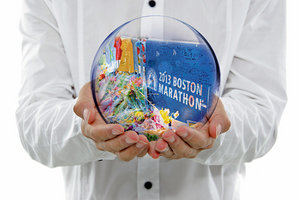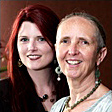"Our medicine combined with the empathetic nature of its practitioners, can serve as a powerful intervention for crisis care and a vehicle of hope during and following times of catastrophe." - Janette Reber MAc, LAc, Boston Acupuncture Trauma Relief co-founder
The phrase "Boston Strong" was quickly coined to describe the resilience of Bostonians that many local and national leaders spoke about. Boston Mayor Thomas Menino said "Nothing will take us down because we take care of one another. Even with the smell of smoke in the air and blood in the streets and tears in our eyes, we triumphed over that hateful act."
That caring spirit flourished as the Boston acupuncture community quickly mobilized efforts to reach out to trauma survivors. New England School of Acupuncture (NESA) with the assistance of the Acupuncture and Oriental Medicine Society of Massachusetts (AOMSM) created the Boston Acupuncture Trauma Relief project. Using a five-point treatment protocol developed by the National Acupuncture Detoxification Association (NADA) and used for trauma survivors by Acupuncturists Without Borders, organizers mobilized volunteer resources to provide compassionate care to survivors and those affected.
Boston Acupuncture Trauma Relief
The Boston Acupuncture Trauma Relief, in affiliation with the New England School of Acupuncture (NESA), was created within days of the bombing to provide free trauma relief through the use of acupuncture to those in need during this difficult time. (Of note, NESA is located in the town bordering the location of the manhunt and subsequent capture of the bombing suspect.)
 At the time of the bombing, NESA students and many administrators were on semester break, but NESA President & CEO Sue Gorman, MBA, wasted no time by posting on the NESA Facebook page within two hours of the bombings that NESA would offer free acupuncture in the Student Teaching Clinic to anyone affected.
At the time of the bombing, NESA students and many administrators were on semester break, but NESA President & CEO Sue Gorman, MBA, wasted no time by posting on the NESA Facebook page within two hours of the bombings that NESA would offer free acupuncture in the Student Teaching Clinic to anyone affected.
Over 8,000 visitors saw the post that day and their first patient the next morning was a runner from the marathon. When asked about her quick response, Gorman said: "Some of our own students, staff and faculty unfortunately witnessed many of these tragedies playing out in their own neighborhoods. Given the widespread ripple effect of the traumas, we felt the need to respond in the one manner that we could - to provide comfort and care to anyone affected by these tragedies. Within days we treated runners, first responders, bombing survivors, and even Watertown neighbors who witnessed gun battles."
Gorman contacted AOMSM the following morning to ask for help to mobilize a team of volunteer acupuncturists. Rebecca Schirber, LAc, MS, AOMSM Board President, immediately sent an email out to the AOMSM membership and by mid-morning 33 volunteers had come forward. Former AOMSM board member, Katie Walker MAc, LAc (NESA class 2013), worked through the night to collect volunteer info, coordinate, and schedule the over 85 acupuncturists who responded throughout the day.
Katie and Janette Reber MAc, LAc, LMT (NESA class 2012) created the Boston Acupuncture Trauma Relief Facebook group by Tuesday morning (https://www.facebook.com/BostonAcupunctureTraumaRelief ). Gorman said "Facebook was a tremendous source of communicating about our trauma clinic. For the week of the bombings (Marathon Monday through Friday) 30,304 unique visitors saw our Facebook posts. The second week saw a drop to 9,433 visitors (we average less than 5,000 visitors per week)."
Social media and technology played a pinnacle role in this unique mobilization.
Within a few days NESA staffers Phuong Nguyen, Sheila Carroll, MEd, and clinical faculty director Valerie Smith, MAc, LAc, built a web page (http://traumarelief.nesa.edu/home) as a portal for both practitioners wanting to help and for those seeking care. Acupuncturists can register their practice or sign up to volunteer on site at NESA. Over 100 licensed acupuncturists in Massachusetts have registered to open their office doors and provide free acupuncture to anyone affected. The website provides a listing of each practitioner, office location and corresponding website for easy consumer access.
Clinics span the state in cities from Chelmsford to Cambridge, Persham to Plymouth. As well, the NESA clinic opened its doors following the tragedy with volunteers standing by to provide free care to anyone who needed it. The work of Boston Acupuncture Trauma Relief continues on. Janette Reber says "I am working now to form connections with the area first responders so that we can go to them to provide treatment. It is my hope that the alliance we have formed remains united and advocates the power of our medicine to transform health and society and that we pledge to serve selflessly as a community of professionals in times of great need."
Treatment protocol uses the NADA five-point PTSD prescription on each ear. The website educated consumers that "acupuncture treatments are effective for helping people facing stress, anger, frustration, depression, fatigue, and other emotional and physical pain. Therapeutic effects can occur quickly and last for a week or more. These simple acupuncture treatments have a positive, transformative effect, without requiring the recipient to discuss their symptoms or emotions, unless they would like to."
By May 10th, over 100 trauma patients have been seen at the NESA Teaching clinic. Anyone who calls for a trauma relief treatment is fit into the schedule, that day if possible, and the treatment is free. The trauma clinic has averaged between 25-35 treatments per week. The need to continue the clinic will be evaluated in June.
The quick response of the Boston practitioners can be an inspiration to any community wanting to provide a holistic response to a tragedy. The outcome of such an effort was best summed up by Tom Ralston, 54 of Revere, MA who was watching the end of the race on Boylston Street where he was struck by the second blast and sustained arm and nerve damage, as well as hearing loss:
"NESA was a great relief to me when I most needed some comfort. The staff was extremely helpful and understanding of my feelings and current condition. I was welcomed immediately, and dealt with professionally by the acupuncturist who explained everything she was about to do, and how it would help me. After approximately 40 minutes of treatment, I was feeling at peace and relaxed. I would highly recommend this treatment to anyone with trauma, and I can't thank NESA enough for opening their doors for victims like me, who were directly affected by the Boston Marathon bombings."
For more information on how to get involved and assist those affected by the Boston bombings, you can contact The New England School of Acupuncture at 617-558-6372.
You can also connect with them online at nesa.edu or traumarelief.nesa.edu.
Click here for previous articles by Elizabeth Sommers, PhD, MPH, LAc.
Click here for more information about Kristen E. Porter, PhD, MS, MAc, LAc.




